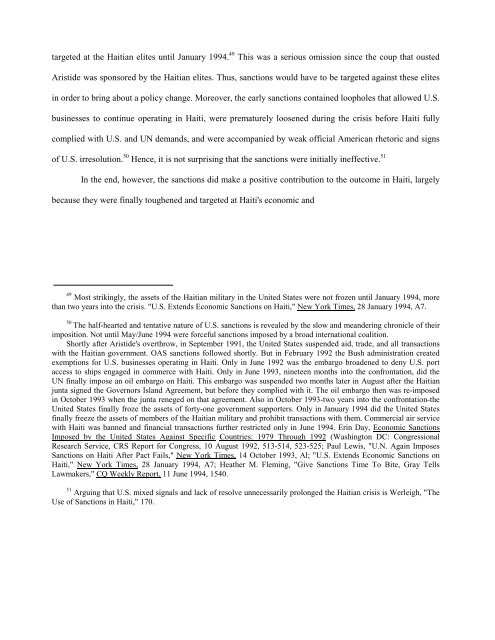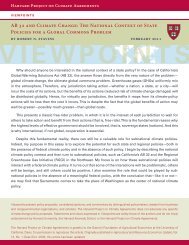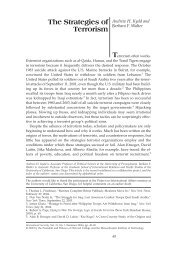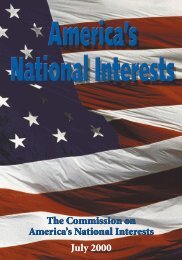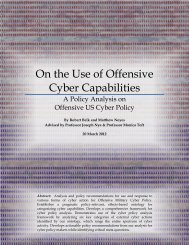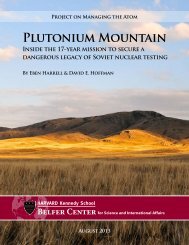Using Economic Sanctions to Prevent Deadly Conflict Elizabeth S ...
Using Economic Sanctions to Prevent Deadly Conflict Elizabeth S ...
Using Economic Sanctions to Prevent Deadly Conflict Elizabeth S ...
Create successful ePaper yourself
Turn your PDF publications into a flip-book with our unique Google optimized e-Paper software.
targeted at the Haitian elites until January 1994. 49 This was a serious omission since the coup that oustedAristide was sponsored by the Haitian elites. Thus, sanctions would have <strong>to</strong> be targeted against these elitesin order <strong>to</strong> bring about a policy change. Moreover, the early sanctions contained loopholes that allowed U.S.businesses <strong>to</strong> continue operating in Haiti, were prematurely loosened during the crisis before Haiti fullycomplied with U.S. and UN demands, and were accompanied by weak official American rhe<strong>to</strong>ric and signsof U.S. irresolution. 50 Hence, it is not surprising that the sanctions were initially ineffective. 51In the end, however, the sanctions did make a positive contribution <strong>to</strong> the outcome in Haiti, largelybecause they were finally <strong>to</strong>ughened and targeted at Haiti's economic and49 Most strikingly, the assets of the Haitian military in the United States were not frozen until January 1994, morethan two years in<strong>to</strong> the crisis. "U.S. Extends <strong>Economic</strong> <strong>Sanctions</strong> on Haiti," New York Times, 28 January 1994, A7.50The half-hearted and tentative nature of U.S. sanctions is revealed by the slow and meandering chronicle of theirimposition. Not until May/June 1994 were forceful sanctions imposed by a broad international coalition.Shortly after Aristide's overthrow, in September 1991, the United States suspended aid, trade, and all transactionswith the Haitian government. OAS sanctions followed shortly. But in February 1992 the Bush administration createdexemptions for U.S. businesses operating in Haiti. Only in June 1992 was the embargo broadened <strong>to</strong> deny U.S. portaccess <strong>to</strong> ships engaged in commerce with Haiti. Only in June 1993, nineteen months in<strong>to</strong> the confrontation, did theUN finally impose an oil embargo on Haiti. This embargo was suspended two months later in August after the Haitianjunta signed the Governors Island Agreement, but before they complied with it. The oil embargo then was re-imposedin Oc<strong>to</strong>ber 1993 when the junta reneged on that agreement. Also in Oc<strong>to</strong>ber 1993-two years in<strong>to</strong> the confrontation-theUnited States finally froze the assets of forty-one government supporters. Only in January 1994 did the United Statesfinally freeze the assets of members of the Haitian military and prohibit transactions with them. Commercial air servicewith Haiti was banned and financial transactions further restricted only in June 1994. Erin Day, <strong>Economic</strong> <strong>Sanctions</strong>Imposed by the United States Against Specific Countries: 1979 Through 1992 (Washing<strong>to</strong>n DC: CongressionalResearch Service, CRS Report for Congress, 10 August 1992, 513-514, 523-525; Paul Lewis, "U.N. Again Imposes<strong>Sanctions</strong> on Haiti After Pact Fails," New York Times, 14 Oc<strong>to</strong>ber 1993, Al; "U.S. Extends <strong>Economic</strong> <strong>Sanctions</strong> onHaiti," New York Times, 28 January 1994, A7; Heather M. Fleming, "Give <strong>Sanctions</strong> Time To Bite, Gray TellsLawmakers," CQ Weekly Report, 11 June 1994, 1540.51 Arguing that U.S. mixed signals and lack of resolve unnecessarily prolonged the Haitian crisis is Werleigh, "TheUse of <strong>Sanctions</strong> in Haiti," 170.


